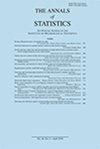Inference for conditional value-at-risk of a predictive regression
IF 3.7
1区 数学
Q1 STATISTICS & PROBABILITY
引用次数: 10
Abstract
Conditional value-at-risk is a popular risk measure in risk management. We study the inference problem of conditional value-at-risk under a linear predictive regression model. We derive the asymptotic distribution of the least squares estimator for the conditional value-at-risk. Our results relax the model assumptions made in Chun et al. (2012) and correct their mistake in the asymptotic variance expression. We show that the asymptotic variance depends on the quantile density function of the unobserved error and whether the model has a predictor with infinite variance, which makes it challenging to actually quantify the uncertainty of the conditional risk measure. To make the inference feasible, we then propose a smooth empirical likelihood based method for constructing a confidence interval for the conditional value-at-risk based on either independent errors or GARCH errors. Our approach not only bypasses the challenge of directly estimating the asymptotic variance but also does not need to know whether there exists an infinite variance predictor in the predictive model. Furthermore, we apply the same idea to the quantile regression method, which allows infinite variance predictors and generalizes the parameter estimation in Whang (2006) to conditional value-at-risk in the supplementary material. We demonstrate the finite sample performance of the derived confidence intervals through numerical studies before applying them to real data.预测回归的条件风险值推断
条件风险价值是风险管理中常用的风险度量。研究了线性预测回归模型下条件风险值的推理问题。导出了条件风险值的最小二乘估计量的渐近分布。我们的结果放宽了Chun等人(2012)的模型假设,并纠正了他们在渐近方差表达式中的错误。我们表明渐近方差取决于未观测误差的分位数密度函数以及模型是否具有具有无限方差的预测器,这使得实际量化条件风险度量的不确定性具有挑战性。为了使推理可行,我们提出了一种光滑的基于经验似然的方法,用于构建基于独立误差或GARCH误差的条件风险值的置信区间。我们的方法不仅绕过了直接估计渐近方差的挑战,而且不需要知道预测模型中是否存在无限方差预测器。此外,我们将相同的思想应用于分位数回归方法,该方法允许无限方差预测因子,并将Whang(2006)中的参数估计推广到补充材料中的条件风险值。在将所得置信区间应用于实际数据之前,通过数值研究证明了所得置信区间的有限样本性能。
本文章由计算机程序翻译,如有差异,请以英文原文为准。
求助全文
约1分钟内获得全文
求助全文
来源期刊

Annals of Statistics
数学-统计学与概率论
CiteScore
9.30
自引率
8.90%
发文量
119
审稿时长
6-12 weeks
期刊介绍:
The Annals of Statistics aim to publish research papers of highest quality reflecting the many facets of contemporary statistics. Primary emphasis is placed on importance and originality, not on formalism. The journal aims to cover all areas of statistics, especially mathematical statistics and applied & interdisciplinary statistics. Of course many of the best papers will touch on more than one of these general areas, because the discipline of statistics has deep roots in mathematics, and in substantive scientific fields.
 求助内容:
求助内容: 应助结果提醒方式:
应助结果提醒方式:


